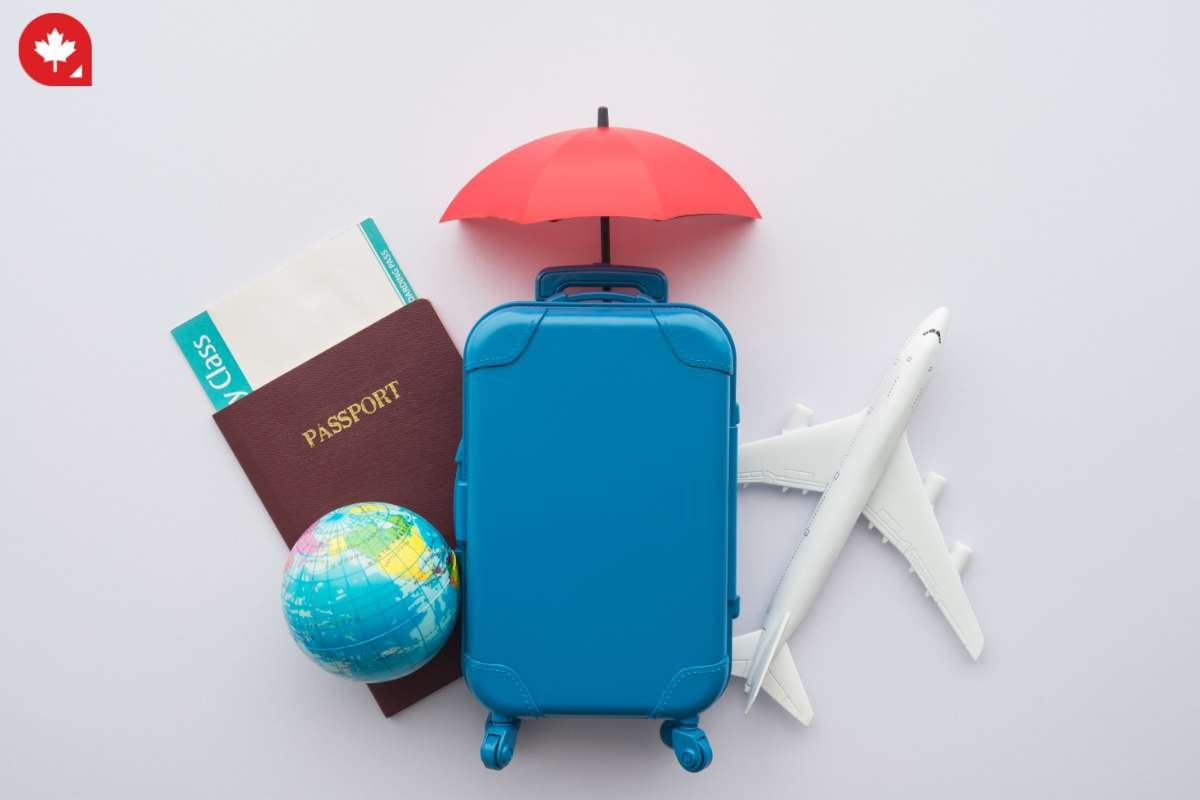Traveling is one of life's greatest pleasures, offering a chance to explore new places, experience different cultures, and create lasting memories. However, when venturing abroad, the excitement can sometimes be overshadowed by concerns about the unforeseen, such as medical emergencies, trip cancellations, or lost luggage. This is where travel insurance comes in.
If you are a newcomer to Canada, you should know that Canadian travel insurance provides peace of mind by covering various risks. In this article, we'll answer seven frequently asked questions about Canadian travel insurance to help you make informed decisions.
What is Canadian Travel Insurance?
Canadian travel insurance is a policy designed to protect travelers from financial losses due to unexpected travel events. It typically includes coverage for various situations, such as emergency medical expenses, trip cancellation or interruption, lost baggage, and travel delays. Canadian travel insurance is available for domestic and international trips, offering varying levels of coverage depending on the policy you choose.
For example, emergency medical coverage can help cover the cost of hospitalization, doctor visits, or evacuation if you fall ill or get injured while traveling. On the other hand, trip cancellation insurance can reimburse you for non-refundable trip expenses if you have to cancel your trip due to unforeseen events, such as a medical or family emergency.
When purchasing Canadian travel insurance, it's important to review the specific terms and conditions of the policy to understand what is and isn't covered.
Do I Need Travel Insurance if I Have Provincial Health Coverage

One of the most common misconceptions about Canadian travel insurance is that provincial health coverage (such as the Ontario Health Insurance Plan) is sufficient when traveling abroad. While Canadian provincial health insurance plans cover many healthcare expenses within Canada, they do not provide adequate coverage for medical expenses outside Canada.
Canadian travel insurance provides the necessary protection by covering expenses not paid for by provincial health plans, including emergency medical services, hospital stays, and evacuation costs. As such, if you're planning to travel outside of Canada, purchasing a separate travel insurance policy is highly recommended to ensure you're fully covered.
What Does Emergency Medical Travel Insurance Cover?
Emergency medical travel insurance is one of travelers' most essential types of coverage. This type of insurance helps cover medical expenses incurred during a trip in the event of illness, injury, or other health-related emergencies. The coverage typically includes the following:
- Emergency Medical Treatment: If you become ill or injured while traveling, emergency medical insurance covers the cost of treatments, doctor visits, and hospitalization.
- Ambulance Services: This includes both ground and air ambulance services in the event you need to be transported to a medical facility.
- Medical Evacuation: If you're in a remote area where appropriate medical care is not available, the insurance will cover the cost of evacuation to the nearest hospital or medical facility.
- Repatriation of Remains: In the unfortunate event of a death, repatriation insurance will cover the cost of transporting the deceased back to Canada.
- Prescription Medications: If you require medication while abroad, your insurance may cover the cost of prescriptions.
It's important to note that emergency medical travel insurance typically comes with a variety of exclusions. For example, it may not cover pre-existing conditions or injuries from high-risk activities such as skydiving or extreme sports. Be sure to read the fine print of your policy and disclose any existing medical conditions before purchasing coverage.
What Does Trip Cancellation or Interruption Insurance Cover?

Trip cancellation and interruption insurance are two closely related types of coverage designed to protect you financially in case your trip is disrupted. Here's how each one works.
Trip Cancellation Insurance
This covers non-refundable costs if you need to cancel your trip before departure due to unforeseen circumstances. Common reasons for cancellation include illness or injury (to you, a travel companion, or a family member), the death of a family member, or issues with your travel provider (such as airline bankruptcy).
Trip Interruption Insurance
This kicks in if your trip is interrupted while you're already traveling. For example, if you fall ill and need to return home early or if you experience a covered event such as a natural disaster that forces you to cut your trip short, trip interruption insurance will reimburse you for additional expenses, such as flight changes, accommodation, and meals.
Trip cancellation and interruption insurance can save you from substantial losses, especially if you've pre-paid for flights, hotel accommodations, or tours. However, like emergency medical insurance, trip cancellation policies often have exclusions. For instance, most policies don't cover cancellations due to travel delays caused by weather or changes in personal plans unless they're related to a covered event.
How Does Lost or Delayed Baggage Insurance Work?
Lost or delayed baggage insurance is designed to reimburse you for the loss, damage, or delay of your personal belongings while traveling. The coverage typically includes:
- Lost Baggage: If your luggage is lost by an airline or other transportation provider, this insurance will reimburse you for the value of the lost items up to a specified limit.
- Delayed Baggage: If your luggage is delayed for a specified period (typically 12 to 24 hours), the insurance will reimburse you for the cost of essential items like clothing, toiletries, and medication that you need while waiting for your bag to be delivered.
- Damaged Baggage: If your baggage is damaged during transit, you can file a claim to recover the value of the damaged items.
It's important to note that baggage insurance typically has a claim limit, meaning you may not be fully reimbursed for the entire value of your lost or damaged items. Additionally, basic baggage insurance may not cover certain items like electronics, jewelry, and cash.
In the case of delayed baggage, some travel insurance policies may provide additional coverage for the cost of purchasing essential items until your luggage is returned. Always keep receipts for any items you purchase in case you need to make a claim.
What Are the Exclusions in Canadian Travel Insurance?
Like any insurance policy, Canadian travel insurance has exclusions - situations or conditions where coverage will not apply. Here are common exclusions to watch out for.
Pre-existing Medical Conditions
Pre-existing medical conditions refer to any health issues or conditions you had before purchasing your travel insurance policy, such as diabetes, asthma, or heart disease. Many standard travel insurance policies exclude coverage for medical expenses related to these conditions, meaning if you require treatment while traveling due to your pre-existing health issue, the insurance may not cover the costs. However, some insurers offer specialized coverage or waivers that can include pre-existing conditions, often at an additional cost.
It's important to disclose your condition when applying for coverage to ensure you receive the right protection. Failing to do so could lead to denied claims or a lack of coverage if a medical emergency arises related to your pre-existing condition. Always carefully review your policy's terms or ask your insurer about options for coverage before you travel.
High-Risk Activities
High-risk activities, such as skydiving, bungee jumping, scuba diving, and rock climbing, are often excluded from standard travel insurance policies due to the increased risk of injury or accidents associated with these activities.
If you plan to participate in these types of activities, it's crucial to check the fine print of your policy to determine whether they are covered. Some insurers offer specialized "adventure sports" or "extreme sports" coverage as an add-on to your policy, which will extend protection for injuries related to high-risk activities. Without this additional coverage, you may be left with significant out-of-pocket expenses if an accident occurs while engaging in such activities.
It's also important to ensure that the insurance you select covers the specific activities you're planning to do, as certain sports may have different requirements or exclusions depending on the insurer. Always inform your insurance provider about your plans so they can provide the appropriate coverage for your trip.
Travel Against Medical Advice
Traveling against medical advice (TAMA) is a significant exclusion in most travel insurance policies. If you choose to travel despite a doctor or medical professional advising against it, your coverage may be entirely voided. This means that if you were to experience a medical emergency during your trip, the insurance company could refuse to pay for treatment or related expenses.
For example, if you have a known medical condition, such as heart disease or a recent surgery, and your doctor advises you not to travel due to potential risks, traveling anyway could result in your insurance being invalidated. It's essential to follow medical advice to avoid jeopardizing your health and your travel insurance coverage. If you are in a situation where you must travel against medical advice, some insurers may offer limited coverage, but this usually requires disclosing the situation in advance and possibly paying an additional premium.
Alcohol and Drug Use
Many travel insurance policies include an exclusion for accidents or injuries that occur while you are under the influence of alcohol or drugs. If you are injured or become ill during your trip and it's determined that alcohol or drugs played a role in the incident, your claim may be denied, and you could be responsible for all medical expenses. This exclusion typically applies to both legal substances (such as alcohol) and illegal drugs, as well as prescription medications that are misused.
Some insurers may also impose limits on coverage if alcohol or drug use is involved in an incident, such as during an accident or if you engage in risky behavior (e.g., participating in extreme activities while intoxicated). It's important to be aware of this exclusion and practice caution while traveling, especially in countries where laws around alcohol and drug use may differ significantly from those in Canada. If you have concerns or plan to partake in certain activities, it's a good idea to discuss these with your insurer in advance to better understand the limits of your coverage.
Civil Unrest and War
Travel insurance typically doesn't cover situations arising from war, civil unrest, or terrorism, as these events are considered high-risk scenarios that insurers generally exclude due to their unpredictable and widespread nature. This means that if you are injured, stranded, or experience property damage due to conflict, political instability, or terrorist attacks, your standard travel insurance may not provide coverage.
Some insurers do, however, offer specialized "war risk" or "terrorism coverage" as an optional add-on, which can protect against certain losses incurred in the event of these types of incidents. It's important to note that coverage for civil unrest or terrorism may come with specific conditions, such as only covering certain regions or excluding coverage if you were traveling to an area already deemed unsafe by government travel advisories.
If you're traveling to a destination with known risks related to these events, it's wise to purchase this additional coverage or consider other safety measures, such as closely monitoring local conditions and adhering to government advice. Always read the terms and exclusions of your policy to ensure that you have appropriate coverage for your travel plans.
How Do I Choose the Right Canadian Travel Insurance?

Choosing the right Canadian travel insurance depends on several factors, including your travel destination, the length of your trip, your health condition, and your planned activities. Here are some tips to help you select the right policy.
Assess Your Needs
Think about what type of coverage you need. If you're traveling internationally, emergency medical coverage is a must. If you're booking a non-refundable trip, trip cancellation insurance might be necessary.
Compare Policies
Different insurance providers offer various plans with different coverage limits and exclusions. It's important to compare several options to ensure you're getting the best coverage for your needs at the best price.
Disclose Your Health Status
Be sure to disclose any pre-existing medical conditions to ensure that they are covered. Some insurers may offer waivers or extensions to cover pre-existing conditions under certain circumstances.
Check the Fine Print
Always read the policy documents carefully, paying attention to exclusions, claim procedures, and the coverage limits. Ensure you fully understand what you're covered for before you purchase.
Consider the Destination
Some destinations, especially those in regions with limited medical infrastructure or higher risk of natural disasters, may require specialized coverage. Make sure your policy is appropriate for the destination you're visiting.
Have Peace of Mind When you Travel
Travel insurance is an essential tool for safeguarding your financial well-being while traveling. With the right coverage, you can travel with peace of mind, knowing you're protected against unforeseen events such as medical emergencies, trip cancellations, and lost baggage. By understanding the different types of coverage, exclusions, and the factors to consider when selecting a policy, you can ensure that you have the right travel insurance for your needs. Always take the time to carefully review your options and purchase coverage before embarking on your next adventure.
FAQs
Do I Need Travel Insurance for Canada?
It really depends on your reasons for traveling to Canada. If you're planning to explore the country as a tourist with a Canadian visitor visa then the choice is up to you. Most visitors consider travel insurance a worthwhile investment, especially if they're undertaking high risk activities like skiing at Whistler Blackcomb.
It's important to note that your medical provider at home may not cover you overseas and you also won't be covered by the free public healthcare system in Canada if you do have a medical emergency. Only some work permit holders, international students, and permanent residents can access free healthcare in Canada.
Find out whether non-citizens can get healthcare in Canada.
Do I Need to Have Canadian Travel Insurance For a Canadian Working Holiday?
If you participate in an IEC Program in Canada, including the Working Holiday, Co-Op, and Young Professionals categories, you must get Canadian travel insurance as a strict requirement. Many applicants are rejected purely because they didn't get travel insurance for the full duration of their work permit, which ranges from one to two years.
While provinces like British Columbia offer free healthcare to IEC work permit holders, it won't be accepted by immigration officers because it doesn't cover things like repatriation costs.




